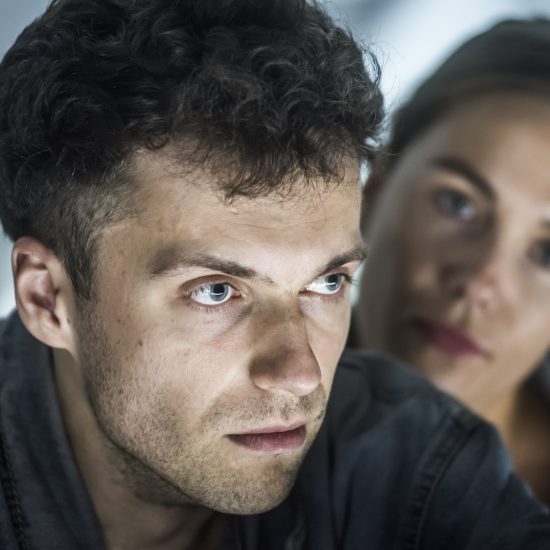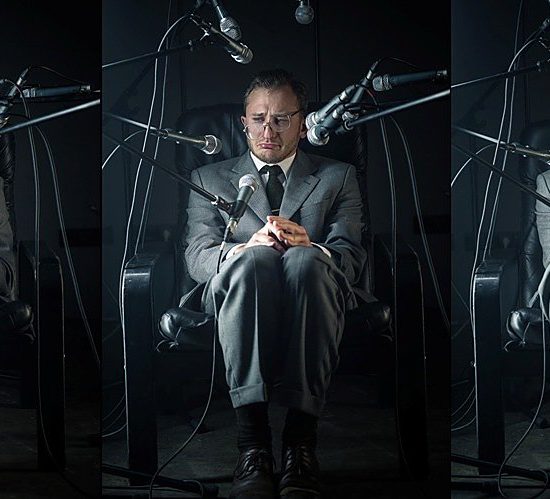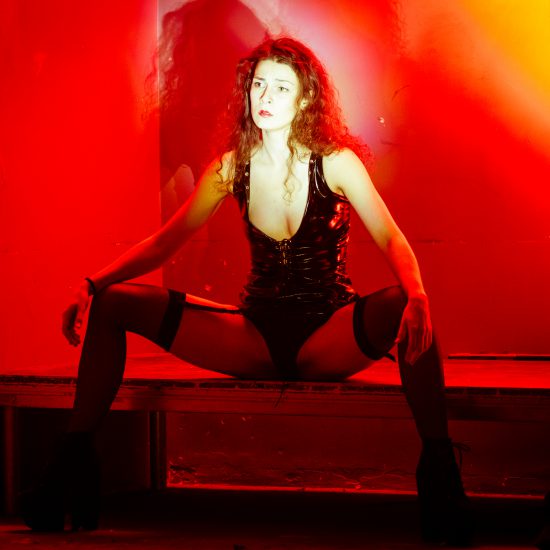THE SKY OF THE LOWER DEPTHS or THERE ARE NEW FORMS!
It is hard to quickly and briefly describe my very fresh experience of such a play, but it is impossible to control the desire to express a few particularly vivid emotional impressions, because very soon they will be formulated and re-formulated, evaluated and re-evaluated by others and alas their primal freshness will be gone. By now it is clear that with this play the OKT group – director Oskaras Koršunovas and his team – has made a qualitative leap and succeeded reaching a new peak – The Seagull by A. Chekhov.
The play offers us numerous discoveries and revelations, but Treplyov’s character played by actor Martynas Nedzinskas is the most striking of all. It is safe to say that not only a fantastic role was born tonight, but our whole theatre became enriched with an exceptionally bright stage personality, an actor of the highest level, whose work is difficult to compare to any of the talents and virtuosos of our theatrical culture.
Nedzinskas has so far demonstrated his ability to create roles as if out of nothing, bringing his whole extremely rich theatrical world into each performance. The actor plays Treplyov in two different productions of The Seagull. It is a rather unique case when a young actor gets to interpret one of the most complex and demanding roles twice within such a short period of time. I think that’s only one of the many factors which led to the success of the actor and the performance. Like a team of climbers who go up Mount Everest knowing that only few of them will have the chance to plant a victory flag at the top, the team of OKT intelligently and passionately storm the peak of Chekhov’s Seagull.
I agree with O. Koršunovas claim that this is the third step in the Hamlet – Lower Depths – Seagull trilogy. The search for a new theatrical reality must be interpreted exactly in this trajectory. The fact that the director has chosen the style of actualization of the classical sound is also true, but that’s not all. There have been many Seagulls inhabited with supposedly modern types of characters, shocking the audience with their “modern” intonations. This condition is neither sufficient nor necessary if the director fails to feel the “pulse” of the play. I’d call this “Chekhovian Transcendence” (usually described as Chekhovian Poetics): the pathos of its content lies in a relentless and passionate drive for a meaningful life, achieved by Koršunovas in this production. If A. Chekhov is rightfully called “the bard of intelligence”, The Seagull really deserves to be titled the most intelligent of all productions of Oskaras Koršunovas.
The incredibly impressive role of Arkadina played by Nelė Savičenko is another overwhelming proof of the actress’ amazing ability to build-up the crescendo of her roles. Sorin, played by Darius Meškauskas, deserves the title of the most intelligent role of the year. Rasa Samuolytė’s passionate Masha is one of the cornerstones of the play. Doctor Dorn, played by Dainius Gavenonis, is full of meaningful “inner directing”. Vytautas Anužis plays Shamrayev in a way that this “narrow” (in terms of acting and the play) role becomes unexpectedly deep and distinctive. And Airida Gintautaitė’s Polina is just amazing – no one could expect such fantastic eccentricity neither from the role nor from the artist.
Medvedenko (Giedrius Savickas) – a wonderful character, a tuning fork of the play’s mood.
Darius Gumauskas presents his Trigorin as a very modern and recognizable “star” type of character, perfectly matching both Arkadina and Nina Zarechnaya. The young and inexperienced actress Gelminė Glemžaitė (Nina Zarechnaya) does not have and cannot have the interpretative experience to lift the traditional semantic weight of the role, but in this solution she is not required to. So the two of them – Nedzinskas’ Treplyov and Glemžaitė’s Nina – are perfect representatives of the lost modern day generation, sometimes tearfully clinging to one another, and sometimes plunging into the world of other people’s passionate orgies in order to be ruthlessly smashed by it. They are an excellent acting duo.
In the sphere of directorial decisions, this performance deserves a few “Nobel Prizes” for an entire bouquet of inventions – such as, for example, the “crossbreeding” of the “room theatre” with the “theatre of imagination” and the fantastic “sky” (i.e. ceiling) of the play, controlled in front of the audience by the players. And the paper seagull that gets shot, of course, also deserves a prize.
But the most important achievement of the performance and its essential “new form”, so passionately and purposefully sought after by all the OKT team, is the opening of actor Martynas Nedzinskas’ talent in full beauty, employing all possible means of artistic expression. Focusing on the character of young writer Treplyov on this scale has made this production one of the best productions of the play in the world. Treplyov’s phrase “We need new forms” is the new notional centre of the new play and the manifesto of our theatre in general.
And a special thanks to composer Gintaras Sodeika for “Treplyov Blues”!
***
Konstantinas Borkovskis’ blog, 20th September 2013



